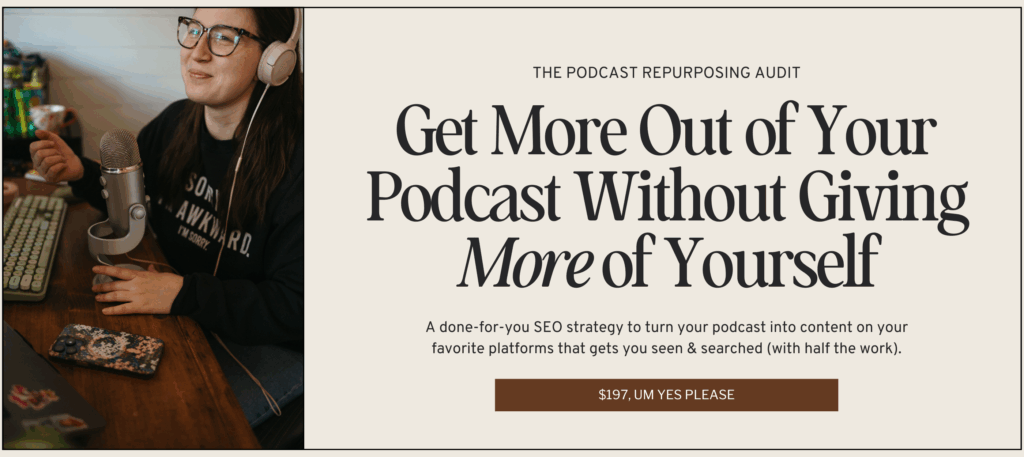I have a love for words and a knack for SEO – and as a mama, I know just how challenging it can be to run a business while raising a family. This blog is just one of the many resources you’ll find here that’ll help you boost your online visibility without sacrificing your sanity.
Thanks for being here (and I hope you’ll stick around).
Mckayla
categories
blogging
seo
Business
free seo checklist
get your checklist
explore
case studies
to the shop
work with us
follow us on instagram
share
Get access to six simple things you can do in 15-minutes or less to improve your SEO and get your website (and content) to show up in search.
Generative AI is quickly becoming the thing that’ll make your life as a content-creating-goblin 100% easier… Or, at least, that’s what you’ve been taught to think. Have you ever noticed that every post is structured the same? That there’s no information on keywords? Incorrect quotes from you and guests?
Probably, because that’s 99% of the repurposed podcast content that AI creates—and it’s killing your SEO.
AI was intended as a tool, not a replacement for you. Now, I’m not gonna sit here and tell you that AI doesn’t make things faster, but the “faster” doesn’t equal better. So, what can you do instead AND how do you still save time so your clients, customers, and students still get top priorty (and best results)?
Here’s what you need to know about why you shouldn’t rely on AI to turn your podcast episodes into SEO blog posts:

What is an “SEO” Blog Post?
Before we get into it, let’s get on the same page real quick: I’m specifically talking about blogging for SEO. While using generative AI is dicey when blogging for other reasons, too, this is specifically when it comes to an SEO-led blogging strategy.
An SEO blog post is a piece of content written on your website with the intention (and strategy) to be it showing up on organic search platforms like Google, Bing, ChatGPT, Perplexity, etc.
Essentially, you’re creating it with the idea that people (your people and audience) will find your content (AKA your podcast-turned-blog posts) without you having to drop the link 24/7.
Why AI Doesn’t Work for Podcast Blog Posts
While you can go Google “how to turn your podcast episodes into blog posts” and find AI tools dedicated to just that, it’s still not the smartest decision. And it’s not because I’m anti-AI (I’m not), it’s because:
#1. ChatGPT (and AI in General) is so Confidently Wrong
Did you know that the way you get a transcript is actually a form of AI? Yep! Some of the most popular podcast transcription platforms like Otter.ai, Descript, and Trint offer an AI based transcription software that you use to take your podcast audio and turn it into text.
And as I’m sure you know, transcriptions love to be at least a little inaccurate. But, with the way generative AI works, a little inaccuracy can turn into a pretty frickin’ big one if you copy/paste your transcript into AI and ask for a blog post.
As an added hurt, AI doesn’t get the infliction of your voice. It doesn’t get a joke, and it definitely isn’t a fan of sarcasm. AI only gets the text and some context clues, which leaves room for sooo many (too many) “oopsies.”
#2. AI Doesn’t Know SEO
Just like getting the “greenlight” from your Yoast plugin doesn’t mean your blog post is actually optimized (or gonna rank), AI doesn’t know SEO.
The best it can do is work off a checklist and use the best practices it’s gathered from everywhere on the world-wide-web—the good AND the bad. SEO is inherently human. It’s guided by human behavior, interests, culture, even the way we learn.
So when you ask AI for an “SEO blog post,” you’re not getting an SEO blog post. You’re getting whatever AI determines to be SEO—which is often a bunch of weird headers, lists for every section, and a “Final Thoughts” conclusion…and let’s not forget the bullet points.
“But what about a trained GPT?? Wouldn’t that work?” Nope! Not without your time spent (and by then, you couldn’t just done it yourself with less edits). But, I’ve worked with some of the best GPTs for personalized content creation like Reveal Studio Co’s AI Bestie and while it’s killer for other uses, it just doesn’t get SEO.
#3. It Doesn’t Really Save Time (If You Want Results)
I won’t act like we have a stack of spare hours to use for blogging when you already have your hands full with podcasting—and, I admit, AI is really attractive when you know it could save you time. But, does it??
I’ve worked with multiple podcasters in Pod to Blog over the last few years, all of whom who relied on AI to turn their podcast episodes into blog posts are having to re-write every. single. post.
Their Google Search Console had hundreds of unindexed pages, improperly structured content, and, when we deep-dived, while some posts would temporarily show up in search, after a few clicks (and users exploring), it’d drop off, ASAP.
Even when they continued to try and use AI to create their content post-program, they’d spend more time editing what ChatGPT produced vs. actually creating the post. But, when they followed the Pod to Blog workflow, they’re able to knock out episodes in only 20 minutes!
How You Can Use AI to Save Time in Your Podcast Blogging Workflow
I’m not gonna be a party pooper and not give you any options for using AI, which is why I’m sharing some of the BEST uses of AI:
- Creating your transcript (duh!)
- Pulling key points from your episode that you can use for your keyword research.
- Coming up with post titles based on your research.
- Creating a general outline.
- Creating infographics and html tables (this is a fave of mine).
So, it’s not a no altogether, it’s just a don’t rely on AI to do it for you or you’ll have to redo it all yourself.
Want to learn more about blogging for SEO? Download this quick checklist to make sure your podcast-blog-posts are headed in the right direction!
Reader Etiquette
© - Content and images in this blog are copyright this blog unless stated otherwise. Feel free to repost or share images for non-commercial purpose, but please make sure to link back to this website and its original post.
℗ - We do not store any information about your visit to our website other than for analytics and optimization for content and reading experience through the use of cookies.
c/o - Our site does at times contain paid advertisements, sponsored content, and/or affiliate links.
You might want to check these out too while you're at it
categories
blogging
SEO
business
It's me, hi! Your SEO bestie.
get to know me
work with us
//
services
//
case studies
//
Mom of three, lover of all things blogging, and borderline obsessive coffee drinker — I also just happen to love making complicated things simple and accessible, especially when it comes to SEO. The blog is a collection of what I've learned from years of testing, trial and error, and working with amazing clients with impactful businesses (just like yours). Blogging and SEO doesn't have to be boring — and it definitely doesn't need to be difficult.
Mckayla
get your checklist
Want to improve your website SEO in one afternoon? This free resource offers 6 actionable steps you can take in 15 minutes or less to instantly improve your SEO.



